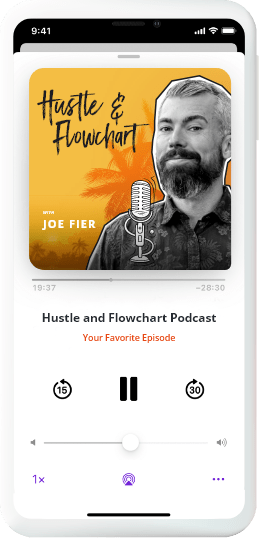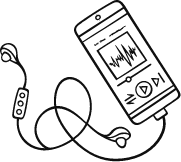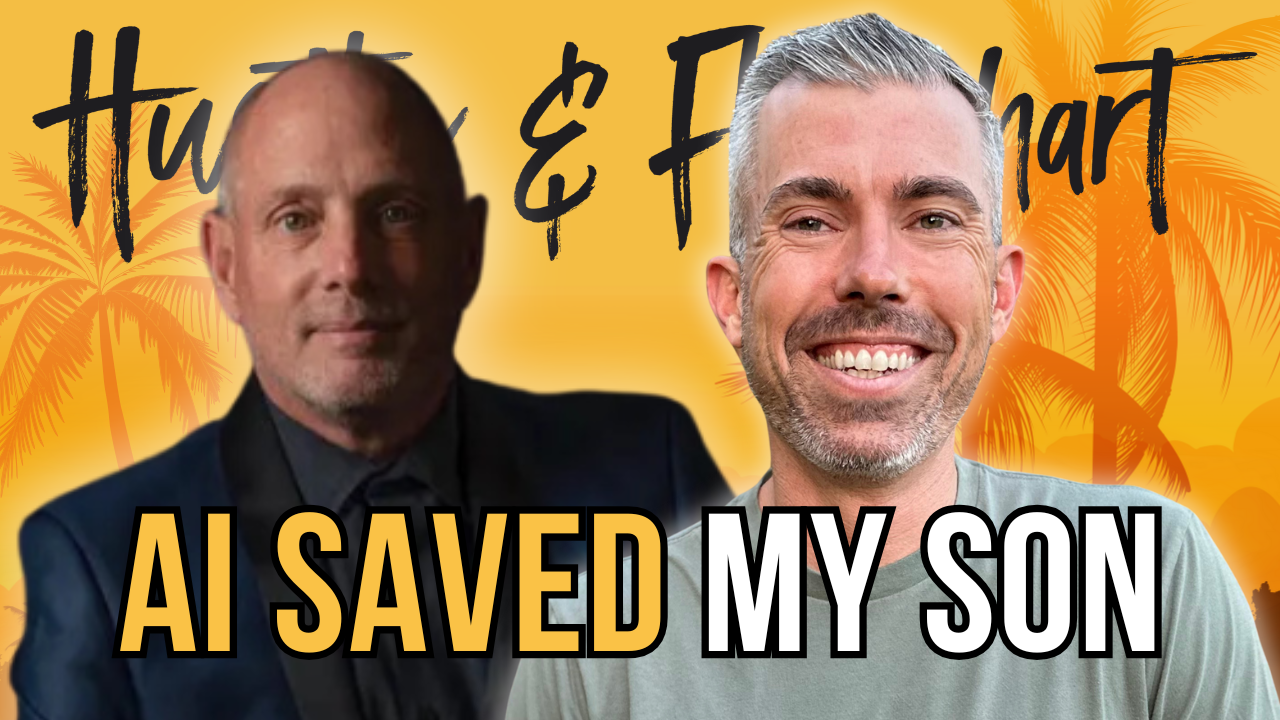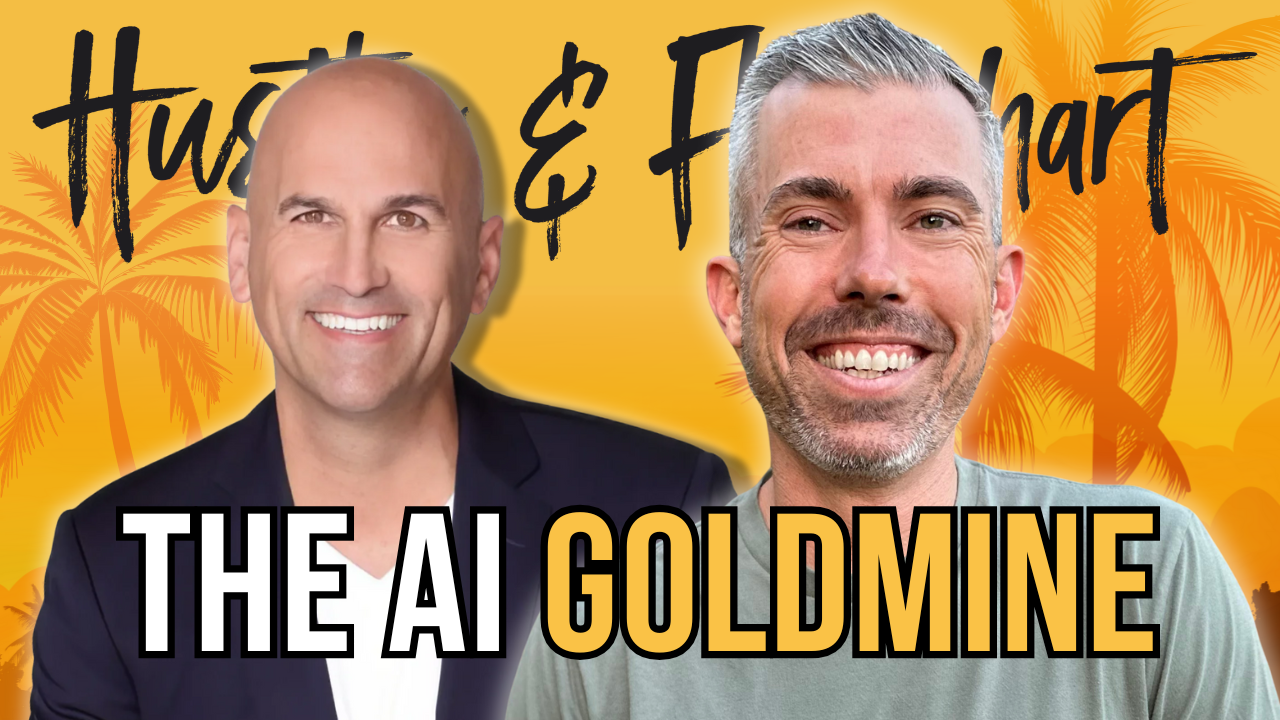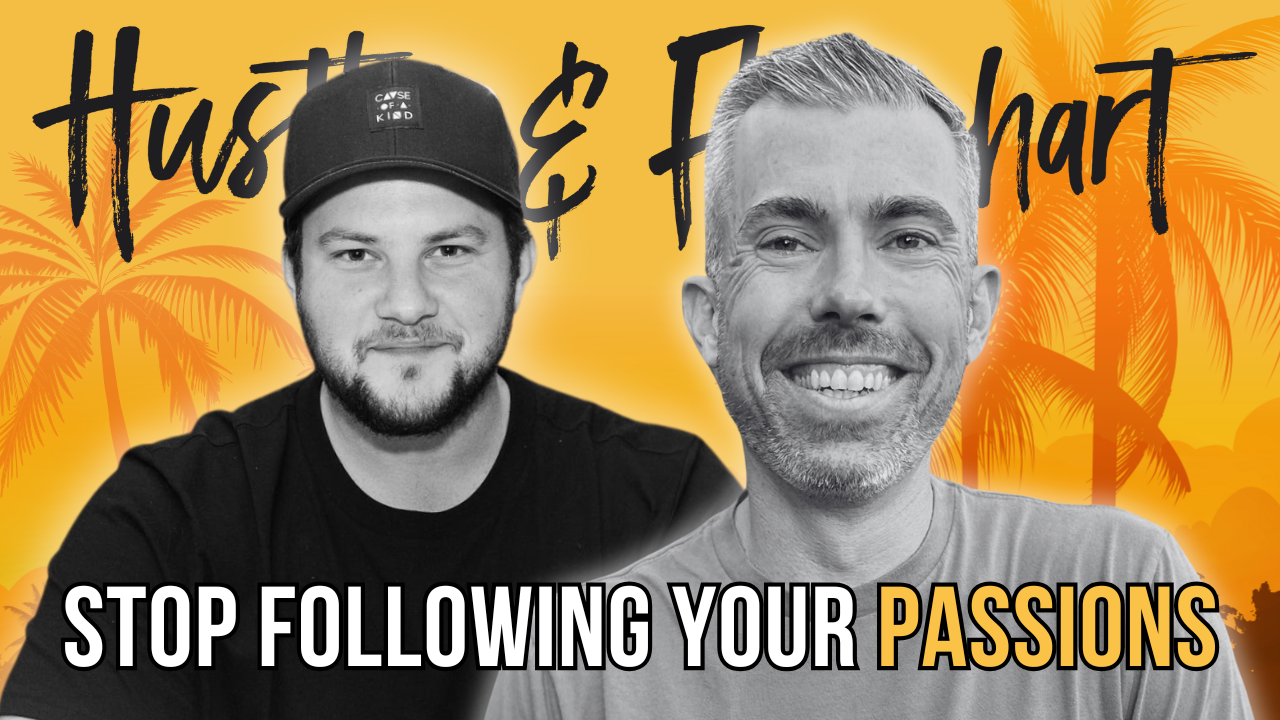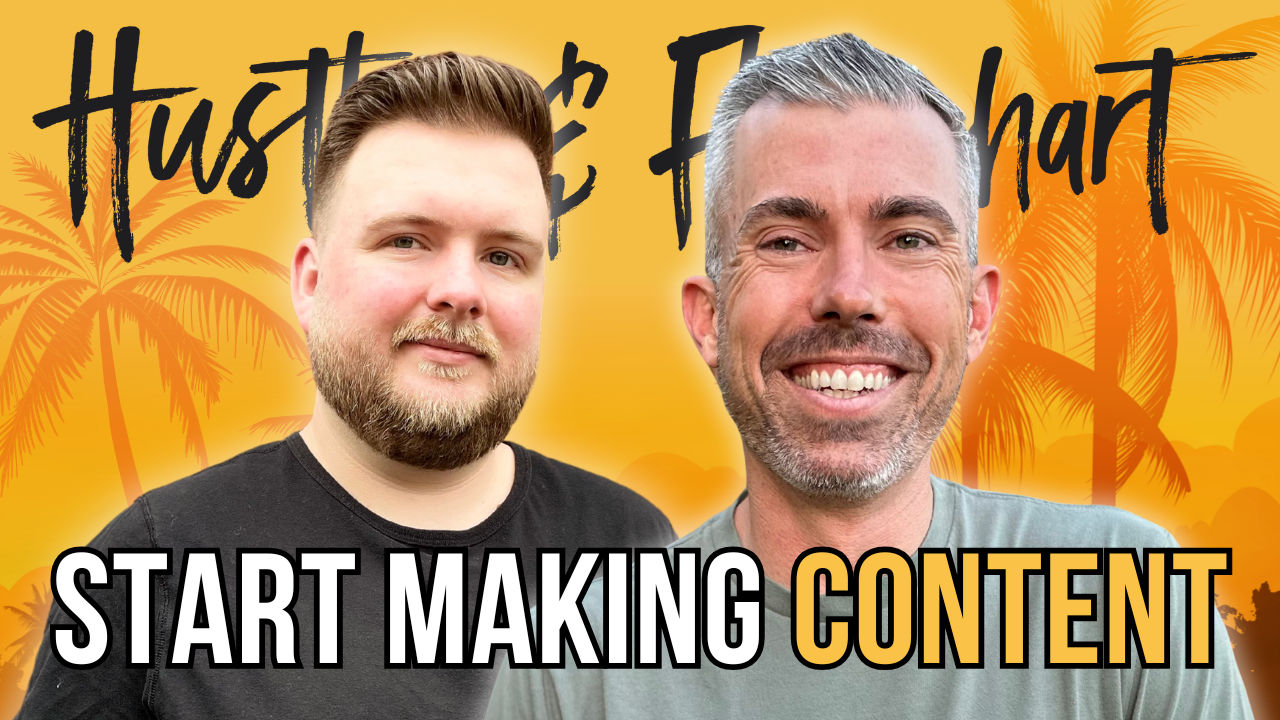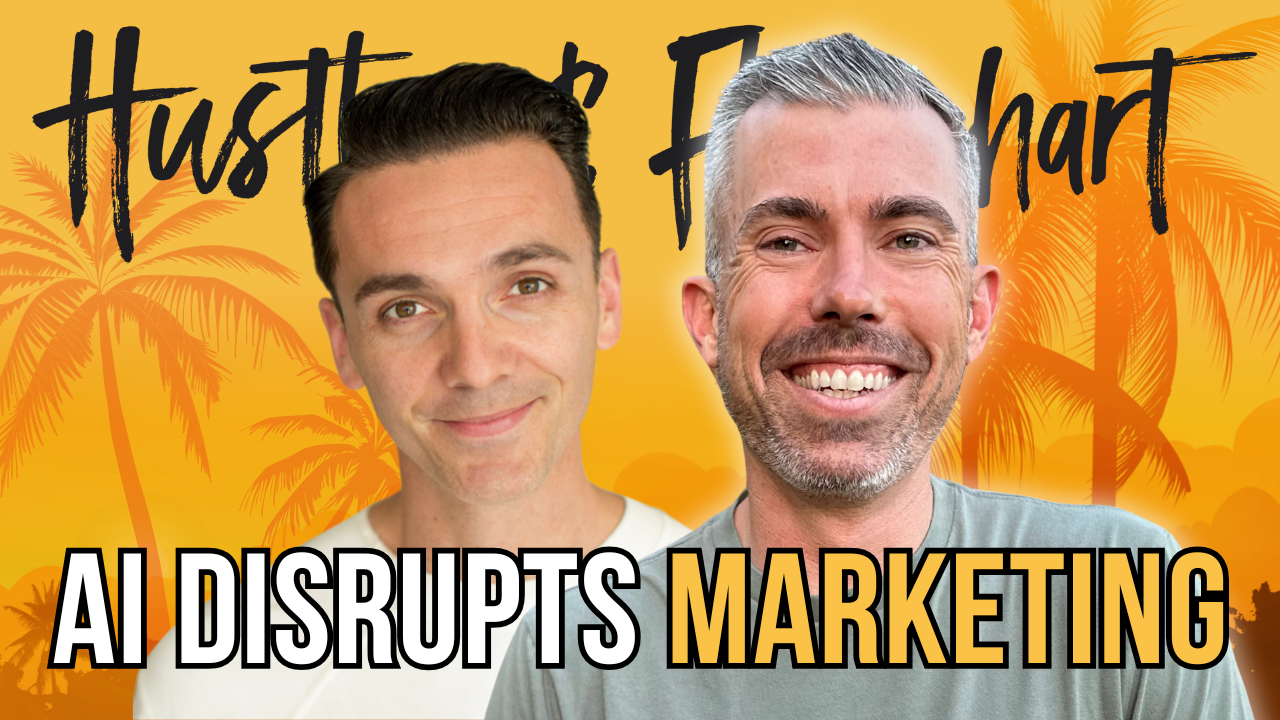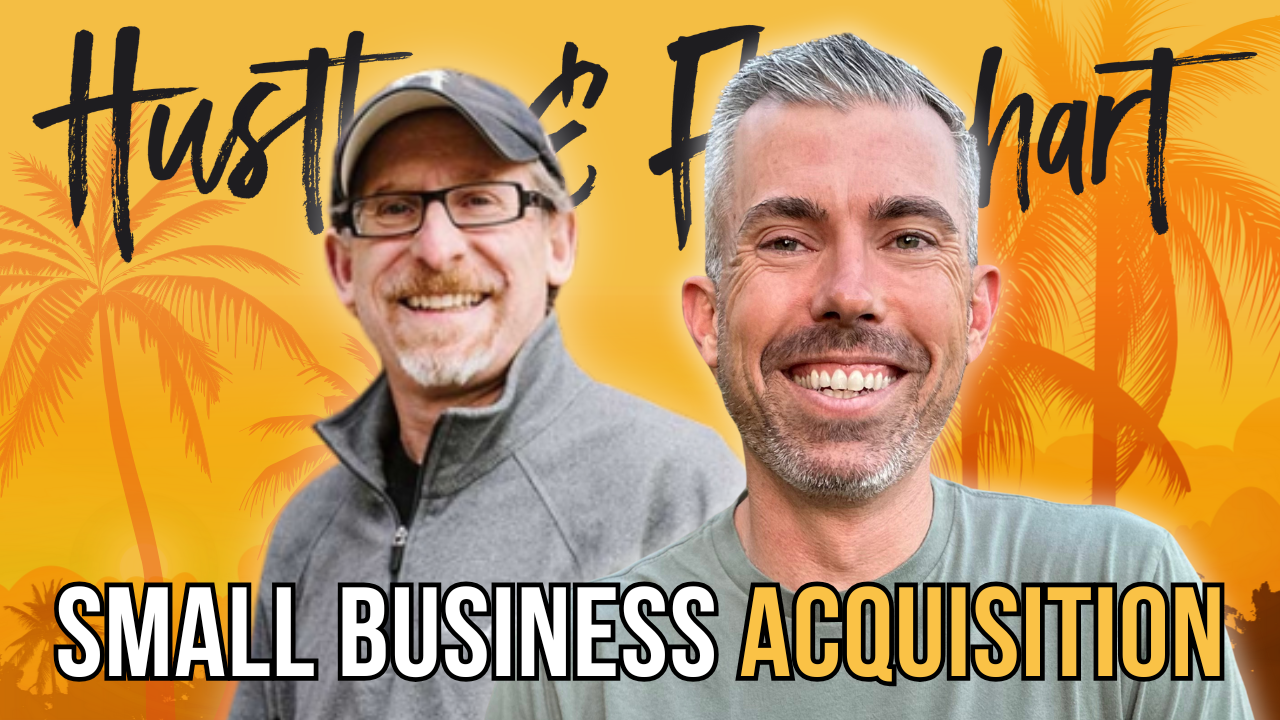It all started out at the horse track. Take one young boy hanging out with his father, add the “need to know” how a horse’s odds of winning a particular race are calculated, to equal Scott Desgrosseilliers recipe for online business success today.
Scott’s love of building databases from the age of 11, coupled with his analytical approach to data he collected moved him from corporate giants Motorola to Apartments.com and onto Infusionsoft (just for fun because he got bored just managing data online). At his last post, he quickly discovered the need for online marketers to collect reliable data about their marketing efforts in order to make better choices with their budget.
Enter Wicked Reports, the company Scott founded a couple years ago that he calls a marketer’s playbook to grow their business faster. Tune in as and get the scoop on the most common misconceptions business owners have about attribution, common tracking errors companies make about their customers, and Scott’s take on the two most important key metrics every online business should be tracking.
And, if data’s your thing, you’ll definitely want to listen in on Chris Mercer’s Google Analytics episode, plus Tina Marie’s take on what data is important to small business owners.
Once you get one thing, you kinda get all of them. Until you get one thing, you don’t get any of it.”– Scott Desgrosseilliers
Table of Contents
ToggleSome Topics We Discussed Include:
- Right or left brained, this tool will help you rule, in attribution data anyway
- The two most important metrics any business owner should track’
- How to reverse engineer high-value customer acquisition
- Discover the average time between first click and first purchase and why it matters
- Why email click-through rate isn’t everything and how even a low one can equal big returns
- How being a comics nerd can translate into a hella good business model
- An easy and free way to start tracking your email success
- How to follow the scale, chill or kill method with paid advertising
- The common tracking errors most companies make online
- Is this tool the video game cheat code for online marketers?
- Why instant gratification is the worst nightmare of online business (even if it seems like a dream come true on the other side of the equation)
- This common oversight will throw off your cold traffic sales conversion numbers, so don’t make it
- The importance of sub-goals for your business
[adrotate group=”3″]
Contact Scott Desgrosseilliers:
- Check out Scott's services on his website
- Follow Wicked Reports on Facebook
- Learn more on the Wicked Reports YouTube channel
References and Links Mentioned:
- Wicked Reports
- The Source of Miracles by Kathleen McGowan
- The Surrender Experiment by Michael A. Singer
- Rocket Fuel by Gino Wickman and Mark C. Winters
- The eMyth by Michael E. Gerber
- The Path of Least Resistance for Managers by Robert Fritz and Peter M. Senge
- Tina Marie – Why You Should Know Your Numbers And What To Do With That Info
- Chris Mercer – You're Using Google Analytics Wrong And Here's A Better Way
- Not sure how to start sytemizing your approach to grow and scale with the metrics you farm? Look into the Advisory for answers.
Subscribe & Review The Hustle & Flowchart Podcast
Thanks for tuning in to this week’s episode of the Hustle & Flow Chart Podcast! If the information shared in these weekly conversations and interviews have helped you in your business journey, please head over to iTunes, subscribe to the show, and leave us an honest review. Your reviews and feedback will not only help us continue to deliver great, helpful content, but it will also help us reach even more amazing entrepreneurs just like you!


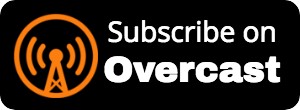
Interview Transcription
Joe: Hey Scott, how you doing man?
Scott: I'm doing great. How are you?
Joe: Pretty good. Yeah. We're, I think this is like long awaited this chat with you. A mutual buddy of ours, Dan Ryan, he's probably our number one lurking subscriber to this podcast.
Matt: Say hello to Dan because he's definitely listening to this.
Scott: Dan the man, how are ya?.
Joe: Yeah man. So yeah, he introduced us. We met a few times, I think at his office, but I mean, I think over the time how we've evolved as a company, we're like, holy moly, we need to talk to Scott at Wicked Reports. Everything you have there, which we'll dig into here. It's just like, it's more glaring. I'm like, shit, we need this. We need to figure out how the hell are people actually turning into customers.
Scott: It tends to help.
Matt: Definitely dive into that and how we, how we figure all that stuff out. And we'll use our own business as an example because selfishly we want to learn your answers to what you would do if you were us. But before we do, et's kind of tell your story real quick, you know, quick two minute little intro, how you kinda got into the business world, how you got the idea for what you're doing now and sort of that evolution. Let's just start there.
Scott: Sure. Well it all started because I loved going to the horse track and betting on horses with my dad.
Matt: Isn't that illegal if you're underage? What were your successes?
Scott: So I did okay. On my little $2, vets, you know, 20 bucks, I get $2, I lost all 10 races with that and so I started like people by looking at the program, all of these numbers, what's the point of and kind of tells you how they did it. Any other races. And I came across the book on how to handicap a standard bred horses. This is an old crappy track in the middle of nowhere, Maine where the horses would ride and the drivers would be on tracks behind the horses. So the oldest math involved trying to figure out what, what made a horse potentially more likely to win. And I got this book on it and I was just fascinated with it and I'm going to. We went to Florida so it's like my eighth grade vacation and I just wanted to score old horse tracks, the whole score, the old horse racing programs to try and predict the winner. I thought it was the coolest thing to use numbers to predict things. And my parents thought I was crazy and kept begging me to go outside.
Scott:I was always into that. So I got into Nasdaq trading in the mid nineties because I was just into systems to try to predict things. I thought it was a fun thing to do and so then I happened to be running all the databases at apartments.com and I was bored and I was moving cross country and they don't allow remote employees but they allowed me to work remote for awhile because I was running a lot of data for them and at the same time I was working with this guy at getMainelobster.com. He's a good friend of mine and he sells live lobsters online. I was doing is Infusionsoft consulting them just as like a hobby. And he was like, “Well Facebook sucks for lobster. I just blew four grand. I got a ton of clicks but only got one sale. I lost 3,000 bucks,” and his budget for the month was four grand. So he was pretty distraught and I was like, well that seems puzzling to me that you thought, you know, some people are gonna see this ad for some random lobster guy.
Scott: And just immediately by just the sounds of that, I go, “Why don't you track the leads over time and see if they buy eventually.” And he's like, “Well how am I going to do that?” And that's kinda how Wicked Reports got started. We decided to hack something up. The next thing I knew about four or five months later, I was able to tell him that women 40 year old or who liked a Boston sports team but didn't live in New England and was worth 10 to one, he like lost his mind over that. Got the ball rolling right there.
Joe: And so that, that early iteration of, Wicked. Now what did that look like? Did you actually go and build a whole software platform to help them determine that just for one person or was that like you poring over Excel spreadsheets and figuring it out for him?
Scott: That was a lot of Excel spreadsheets with a lot of naming conventions and you know, every form of a bunch of hidden fields and manipulating every single link and redirects. It fell apart. The moment you even looked at it, it was like a house of cards that you just had to like pray with enough for us to learn.
Matt: Right. Interesting. So, so were you a software guy before? I mean did, did you dive in and start coding stuff up or did you go, okay, this is a, this is an interesting idea. Let's go find a development team.
All About The Data
Scott: I wanted to prove out the concept first. My background is data. I was a type A. I like when I was eight I put my mother's a Christmas card addresses and recipes on like on my commodore 64 database. I just thought it was easy. It was just always easy for me to do database. So like when I, my first like database job was at Motorola and I was like 26 or excuse me, I think 29. And, they didn't know what everyone was working on in the phone business because excel, we had 52,000 rows at the time and it would crash and they had like 80,000 employees. They have no idea what everyone was doing until I could make a database was like, my background was data and I just immediately, like you told me the problem and pretty quickly I saw like how I would store it and how I would name it, but at the first pass I was just shoving stuff into custom fields and then mapping it through a ton of excel.
Joe: So how did that shake out that first iteration for your lobster buddy?
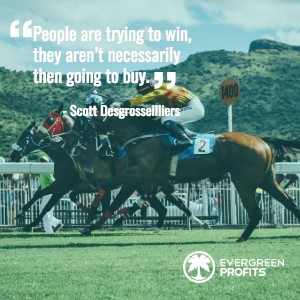
Joe: you bring up a big point that a lot of companies, I know a ton of them just are friends, you know, local companies online that totally got obliterated by Groupon as one. We're not going to go down that pain too far but run their, their company on excel spreadsheets or just random custom fields, but they don't know what the hell that means or how to put it together. So we'll dig into. I think it'd be curious to talk about tracking and just attribution for any business. And I know obviously it spans the gamut. Your software's great for, you know, people actually doing a bunch of advertising, but how would we go approach. You're like, how does it look like attribution these days for a normal company online,
Scott: they don't have it or they're relying strictly on what the ad platforms tell them, which is generally last few, sometimes last click. And the problem with that, it's, I mean it's something but it's just showing the last step of a generally seven to 30, 40 step process. And so when people get frustrated online, the number one thing that I see it on my different facebook ad buyer groups is people can't seem to scale. They're spent. And that's because when they see sales reported inside facebook or ad words, I guess we should go google ads now when you see it in there, it's a mix. Those are the last things. Sometimes someone viewed it, but then they bought off email, sometimes they, they viewed it in ad words and then they bought off facebook. Sometimes the facebook did really make the sale, but it ignores the fact that that person got familiar with your brand or on your email list weeks or months or possibly even years before that. And that's where you found the customer. So when you increase your spend based on what the last thing was, you're not going to get the incremental boost because all, it's just a hodgepodge of data that wasn't meant to answer your question, which is where do I find more customers is just saying here's the last thing they viewed in our platform within 30 days, which isn't, you know, or the last time they clicked down within 30 days depending
Matt: to kind of give like an example from our own business so that. And we still run into this issue ourselves to this day. So hopefully, you know, we'll go down this route a little bit, but you know, some of our, our number one traffic source right now is from SEO. So people often discover us from searching something on Google. They find one of our links to one of our pieces of content. They read it and then once they kind of hit our website, then there are retarget campaigns. We retarget with Google, we retarget with Twitter, we retarget with Facebook, you know, all those types of places. So somebody might discover us from SEO, go to our site, leave. See one of our ads on Facebook, come back to our site, maybe this time around the second time they opt into our list and now they're on our list and then a week later they may get an email from us, click on that email and then finally by. Well that whole path it looks like, okay, the email is what made the sale, but there was a lot that led up to getting that person on our list and you know that that's what we're talking about when we talk about attribution tracking is how do we see that full path and kind of figure out what the. The sort of optimal path we want our customers to take his.
Scott: Yeah. I call that reverse engineering high value customer acquisition. She doesn't flow off the tongue. I've said it about 80 million times now I can say it, like spit this out. Okay. We edit. Yeah. So it's looking at and then there's a lot of touch points. So you've got to try to, I mean you're going to drown in data looking at all of them. So how do you flush out the ones that provide the highest ROI, minimal amount of effort from the business owner to look at.
Matt: You might run into issues to where you go, okay, this person came in through a Google ad that I'm running and then maybe two weeks later they buy off of a facebook retargeting ad. Well, you might find that you have a whole bunch of people coming into your sort of retargeting audience through a Google ad and a but none of them are buying. And then they're being retarget on Facebook. And then finally buying, well I might go shut off that Google ad because I assume that Google ads not doing anything for me because everybody's coming off of the Facebook ad, but you know, I'm throwing the baby out with the bathwater by turning off the thing that drove the initial traffic. But without all the right tracking in place, how do I know that that initial Google ad is what drove most of the clicks that lead to the retarget that lead to the sale?
Scott: Exactly. And we, when we looked at the time in January, we attracted one and a half billion in sales and what all small business sales says a lot of transactions in there. And what we found was that the time between first click and first purchase 42 days. So you know, at that Google ad was 40, 40 days ago if your average end, yes, 40 days ago. And then that retargeting, yeah, you lose it and turn it off. Or if they both happen quick, both of them show sales and then you add up your conversions from both platforms and it's showing double the sales of what you actually had sent. You don't trust the data that way. And then you get all confused because you can't scale ball if you didn't have to sales that day. You had one. So how do you deal with that? Which is a couple of ways to deal with weeds when you're ready or not run terrified from it if you're not up for it.
Matt: Well that's the thing. Yeah, they were setting the stage here because to show, hey, any scale business you're at right now, you better figure out your frigging attribution. This whole…I'm kind of looking at it as like a big customer journey, you know, big path was just another example too is, you know, James Schramko, a mutual friend of all of ours, he actually put out a training video that we watched recently about these videos that he's posting to all the social media channels and he always assumed that LinkedIn was just bad. He kind of, he just kind of stopped doing anything with LinkedIn at all, stopped posting on there, just totally ignored it. But when he actually set up wicked reports and start looking at all of his numbers, he actually found that LinkedIn drove a pretty significant amount of traffic when he posted on LinkedIn. He may not have gotten a lot of engagement on those posts, so we assumed, okay, LinkedIn just kind of sucks for, for marketing. But when you actually looked into the data, he found that LinkedIn was a pretty significant traffic source.
Scott: Yeah, that's an interesting thing with engagement. It doesn't always mean a revenue at all. Not even, I mean, not on the spot, but I mean like ever. And then other times it does. And so you don't know unless you know. I found that with email to everyone poo-poos email now because it's not cool anymore. It's been around forever. I mean just the old curmudgeon in the corner with my cane. What about email? But the truth is, is that people still making a lot of money on email even if it wasn't that even if they saw the retargeting works as well, very well. But people will look through email if they're, if they're hot to buy, they'll then go back. They're the ones reading your email. So they'll go back through and searching to see if like your discount codes or what was that deal?
Marketing Case Study
Scott: I got an email two weeks ago now I'm ready to buy from it, getting a lobster. Had something. I did my, one of my very first digital market or speech, I had him up on stage and he had this one thing where he had sent an email out, got one percent click rate, no one's going to run around and be bragging about their one percent click rate and he made, he made $9,000 on the email. Which is that good or bad? You don't know? Well, Mark's average email was a little over two grand, so he actually made four and a half times what he normally made on emails, even though it had a one percent click rate, he made four and a half times the money, so it was a good email. So then he resends the same thing out to anyone that hadn't clicked. And he made another nine grand. So we had, it was about his birthday, some of lobster in his birthday he made 18 grand getting two percent of his list of clicks. So yeah, that's pretty cool stuff.
Joe: Because yeah, we've definitely heard and we've seen it also occasionally a certain list that, you know, your engagement on email is going down, you know, because of all of these so and so reasons, whatever, but what you just said there, it's like have one percent click through, but what are you selling on the other side of that? Click right there and for sure man. So without something like Wicked or some kind of attribution tracking, you would never know.
Matt: Yeah, I kind of feel like with email engagement that has been sort of declining over the years. The people that actually do engage our higher quality people engaging too. So engagement's going down, but the quality of the actual click is probably going up as a result.
Scott: Yeah. I feel like it's a signal strength. Like you open an email or you view an ad, that's one thing, but if you click, that's another one that's a stronger signal because you willing to say, okay, you've got me enough interested that I'm going to go actually see what you want me to go see if they join your email list. That's a bigger one because now like, okay, I'm going to take all your annoying emails now or hopefully cross my fingers that you don't annoy me. And then of course buying being the ultimate signal. So that's kinda how I tried to look at the different almost point values I was going to get different signals and Wicked was what made when I go and interact. Like I, I hate joining email lists because I try to keep zero inbox. I'm sure as hell not going to take someone else's emails every day just to like, just to be nice or because I'm curious. I'm trying to keep it clean inbox. I'm like a crazy person about it.
Joe: Turn the dial my cell phone. Yeah. Matt's got the zero inbox thing.
Matt: Yeah. I mean, I think Scott and I are actually pretty similar personalities as far as like sort of data numbers nerds for sure. It's funny, this is kind of going back a couple of minutes ago when you were talking about how you used to make spreadsheets. When I was younger I used to use visual basic and Microsoft Access. I had a giant comic book collection. I had thousands of comic books and I entered every single comic book into my database and then I like I, I sorted them by year by title. I gave them all like one to five-star reviews and I had this like giant database of like 2000 comic books that were all ranked in reviewed and it all came because I was such a nerd that I just liked playing with visual basic and Microsoft access.
Scott: Yeah, visual basic as well on a do front-end programming that I just data so stuck with that.
Data Gathering For the Non-Analytics
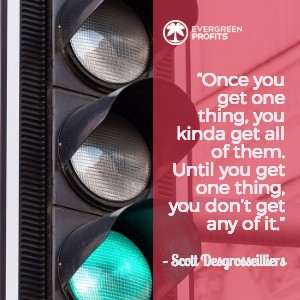
Scott: Oh…
Joe: Cool. I think I'm there too, but for us non-analytical folk, I guess what are some ways that you can grab. Obviously you're grabbing my attention. I've seen the back end of Wicked and kind of what's possible, but I guess for folks who don't dig into the numbers, is there a good way to kind of, I guess, get them in the weeds and get them to start tracking or hire someone?
Scott: Well, the, the easiest way to start is to put UTM codes on your email links because you can do it for free and Google analytics will pick up on the UTM links and you can at least start seeing is anyone clicking on my emails. And then if you set up google analytics goals, you can at least say, oh, when I click on the emails that they then buying or whatever else your goals get. That was what can get some people as accessible. You know, you're sending an email, are people clicking and then are they doing anything? But furthermore it gets you into Google analytics with more meaning because you set those UTM codes up. UTM Codes, I know you touched on them with Chris Mercer, I believe so on the labor and you know, that's not the right word. I want, I want breed state, all this stuff you already mentioned with the UTM Code so you can give meaning and then when you're in Google analytics you can look at all the different cool things with Google analytics using your words.
Scott: You called that email something. How long do those people stay on the site? Did they go anywhere else? Did they do anything? And that's a lot better than just kind of, you know, I think you need to approach, to get into it at first is try to answer a question because that then gives you a focus rather than just aimlessly looking at a grid of numbers and Oh, that's nice. My bounce rates this or you can't do anything with that. Get to go in and say, I sent this email, I want to decide should I send it again or no? And then you'll quickly come to the realization of, Oh crap, I don't know how many of my other emails did, so I don't know if you need any, like a benchmark or baseline to be able to know you're doing better or worse than average. So we do a lot of work on that now to try to give people guidance.
Joe: No, I liked that because my non-analytical brain loves exactly what you just said is approach it with a question because that's something I've always done. And you know, I have luckily Matt over here to do a lot of the tracking stuff and digging into the deep numbers. But if I can go into analytics or some kind of dashboard with some visuals, things are organized in my language, I can start to build a picture at least a little bit and Google analytics, what's happening, what's totally flopping and what's the shit that I should keep sending and doing more of.
Scott: Yeah. When we redid our homepage, when people sign in, our retention went up massive. It was good doing well at the time, but it went way up. But when we were trying to figure out what it was and we realized, oh, we changed our home page and what we did on the homepage, it was inspired by an espn article breaking down the NBA finals. It's just this really cool. It had these different scenarios of like the offense possession or other advanced mba stats and cool visuals. First I was attracted to the visuals, but then I realized, you know, we should just ask the report title should be questions. Why should people even be logging in and they should be asking these questions. Let's just ask them and answer them and tell them what to do with it right when they log in. So even if they, as long as they're tracking setup, right, if they don't want to go look at all the reports that we all love will already give them answers flushed out on the first page.
Joe: I like that. I think the setup, I know that that feels daunting to me at least on the Google UTM side, all that stuff. But I know in the grand scheme it's pretty damn easy.
Scott: It depends on your stack. Some stacks are quite easy and other ones are going to be some work.
Joe: Yeah, for sure. What'd you got? I think you had a question there. I was just going to dig into some of the tracking stuff. I know this is going to be kind of a loaded question because it's going to probably be different for different businesses, but what are some key metrics that you feel most businesses should be keeping an eye on?
Metrics Worth Tracking
Scott: Well, there's a couple. I really like, one being ROI or return on investment because you liked that one and then return on investment. Calculated is a revenue, subtract the cost and then divided by the cost. Otherwise you're otherwise you're going to show that you made 100 percent when you really mean nothing. I liked that one the best because it's a very clear thing that you keep doing whatever you're doing or not. Well, you need to make. You can't lose money forever, so you need to be making money and ROI tells you if you are. So I like that one a lot, a lifetime values, another one, because in order to know what you can spend to acquire a customer, you got to know how valuable they are over the lifetime of them and then you work back from the lifetime value to maybe what's the value in 60 days and then if you want to make money at 60 days and a customer is worth $100 up to 60 days while you can't spend 100 bucks to get a customer, you gotta maybe spent 50. If you want to double your money and then okay, if I'm going to you work back, you could mathematically work back to figure out what you could pay for a lead and then you've got your tactical approach to your overall number strategy, which is, okay, I've worked back that my customer's worth this so I can pay this for a new lead because of my conversion rates all the way down. So now I gotta make sure I'm getting leads in at that price or cheaper. Hopefully it makes sense.
Joe: I love what you just said. There was a mix of strategy. Knowing your numbers, these key metrics, but then going back to the tactics and then you figure out, okay, was it email, was it Facebook? Whatever, you know, and do more of that.
Scott: Yeah. My Q four is about creating, kinda like done for you playbooks that utilize that data and then give you the actions and then walk you through what to go do because usually need to give things like a week. So do this, wait a week and then come here, look at these and then either scale, chill or kill, you know, if it's doing better than normally spend more, you know, if it's doing so, so then chill out because I mean he's still bringing in money and then if it's not, you kill us. And that all depends on having you know, the right bench, look at the right numbers, but then also having a benchmark. So you know, if you're doing better or worse than how you normally do because seeing all these different businesses and Wicked things are so relative, you know, someone to get 10 sales in a day and be ecstatic.
Scott: Someone else, it'd be like a jump off a bridge because the, what your business is and how much you're spending to get those 10 sales for sure. Not. So quick follow-up to that then what, what do you think most, how do I word this? What, what do you think most businesses do wrong when it comes to tracking? What's something you see commonly that I would, I would probably not approach it that way at all. The two things is relying on last click or last view is, is a big mistake because that's all the numbers you generally have. And so then you can't scale earlier parts of your funnel looking at last clip. The other thing is the focus on either the quantity of leads or clicks or the price of them without knowing if there's revenue on the other rent because you know, you can, you can run a survey or a giveaway, you know, that was a rookie marketing thing.
Scott: Everyone probably does have run this contest. I'll give, I'm going to want to win it and only one will win, but then they're all show that they really wanted this product, so then someone going to buy it because I'm going to offer a discount because they ended up. Everyone fucking does that and it sucks. It doesn't work. Oh, maybe if it works, well then you know, I'll still stand by what I said. It's generally sucks then I've seen too many people do it and it doesn't really work that well. I know we tried it. We got sucked into. One is terrible and it was on given up a lifetime Wicked Reports. So I was irritated.
Scott: The contests don't typically work.
Joe: Do you just mean like it doesn't often generate a lot of sales?
Scott: Yeah, it does. More people that enter contests, just want to win stuff. Not necessarily particularly more expensive things. Maybe the $10 thing, whatever, but something that's going to cost a thousand or so, a couple of thousand dollars a lifetime of the investment people are trying to, when they aren't necessarily then go to buy. If you have the pain point for a higher end product and you have the budget, then if the marketing's good enough, you're going to buy it or your pain's bad enough that you need to solve. If you don't know, I've just seen a lot of crappy, crappy audiences.
Joe: that makes sense and yeah, there's a lot of factors there. I know we've had a couple podcasts or a contest guys on the podcast here, but yeah, I could see what you mean. Most people are just kind of hacking something and hoping it'll turn into.
Scott: Yeah, they're buying like a content software. January a few things. If it's done strategically, intelligently, and it could be possible. I mean it's what normally though, when, when things like that happen, like you say, Oh, I went viral with my video. Whatever you hear about it. Then everyone runs around and tries to create viral videos. Well, it's newsworthy because it's news because it doesn't happen a lot. You don't just create a video and then he goes viral, like think of all the videos that are out there. Only a few go viral. Have a few special things that made them work or they followed a framework or someone's system that repeatedly can do it and people will lose that and the noise of, Oh, contests, I'm going to get a ton of cheaply, or someone advertise and I get ten cent video views, like, well, big deal. Maybe it's a big deal. I mean, it depends. You retarget them and then you made 500 percent Roi in a month and that is a big deal. I want to do that too. And if not.
Matt: Yep. I love it. Here's a, this is sort of a selfish question which we ask a lot on our podcast. One of the questions I have, and I don't actually don't even know if this is, this is totally possible or not, but let's say we're, we're trying to scale a podcast. We're actually not necessarily like with the podcast, we're not going for how much is this going to make us? It's very much a branding. We're growing our brand, growing our audience through the podcast. Eventually it will lead to sales as people enter our audience, but would you have any advice for someone on, okay, I want to scale this podcast, what should I be tracking? How should I, how should I manage that?
Scott: Yeah, you could use either utm codes or you know, redirect links will probably still with utm codes and then all your organic place as you're floating this around, you'll be able to set up some sort of tracking to see what leads to subscriptions or podcast downloads and then with that you'd be able to see what's working to grow your audience. So if your metric is listeners, email list growth, then that's what you measure. But so I would say wherever you are promoting it, you need something trackable or else you're not going to know if it worked or not. You know, you're just going to have more subscribers and no idea.
Matt: Yeah. So it's basically figuring out that last point, action, whatever we're going for and then build it back from that way. Yeah, and one of the things we're doing is we're trying to get listeners to our podcast. So what I've. I've actually been doing, and you might, this might be a good idea or better, you know, I'll hear your opinion in a second, but what we're actually doing is I actually have a conversion set for anybody who stays on this site for over a minute, so I'm optimizing for time on site essentially because I can send a shit ton of clicks through Taboola and outbrain and facebook ads and Google ads and all that sort of thing, but I don't really want the people that are going to land on it for four seconds and go, oh, I know it's not what I want and go away, so I'm optimizing for people that stay longer on our site because those are people likely actually pressing play and listening to the podcast.
Scott: I like that. That's a good idea because that's a reasonable guess that they're listing who hangs out for a couple minutes on the site and the stair…
Matt: And I guess the same because we do a ton of affiliate marketing and I know we have a lot of people that do that are listening as well and tracking on that. It's just tough. You know, the standard way, especially if you can't get a pixel on after the sale. Have you seen best practices? Yeah.
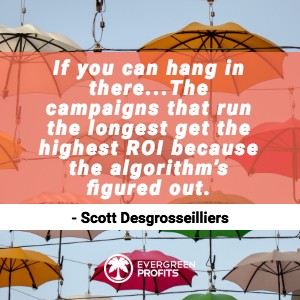
Matt: We are an affiliate.
Scott: Okay. So if you're an affiliate and you need to track leads and sales that happened, you can have the, the person you're selling for fire http posts either through Zapier or infusion soft. I mean there's a lot of ways to do that, to send you a fire. You the event that says, Hey, something good happened here so you can get indication that it's working. It's not done often because you know, there's a little bit of work involved and you know, no one wants to do that, but a, that does work. So it's almost like how the facebook pixel fires on a page for a given event. You can have that happen a couple of different ways that you can get stats go on. One way to do it.
Matt: I mean, the way we're currently doing it right now is we figure, you know, we can only optimize up to the, our last sort of touchpoint, so we use sort of redirect links for our affiliate link. So what we'll. We'll use a tool called pretty link for wordpress. Prelink pro lets you actually put a code in. So this code fires and then redirects. So what we actually do is we have our pixel code on the redirect links and then we fire that as a conversion. So when we're trying to optimize for conversions through affiliate marketing, we're just optimizing for that. Did they clicked who are on our affiliate link to go to the page or the sales actually made. That's the furthest point that we actually can optimize for, for most affiliate products. So that's usually what we're going for is that did they click to our affiliate link all said and done?
Scott: Yeah. That's pretty good. Yeah, that's pretty good. You could emulate, you could have the person you're selling for. Is there another way to say that the affiliate, the affiliate and the product creator, product creator could fire off something for you at different points you identified spots you needed. It wouldn't show showing your signal unless state. Well they can put it in. You're not sure if they could fire it to your facebook Pixel, but they can at least send it to you as data reports. We do those for random things like tracking, you know, a lot of tricky things or things that happened pre wicked reports that they want in what could reports the http posts that up and that's how we get it in there.
A Bit About Wicked Reports Features And Benefits
Matt: Yeah. I think this is probably a good transition into like let's chat about Wicked Reports a bit and some of the capabilities. One of the questions I have is I know, so coming back to the affiliate thing, one of the things that you can do with Facebook now is you can actually manually enter conversions. You don't upload a list of emails and say these all converted and then Facebook will try to match that data with any sort of tracking that came through. And, you know, try to attribute the conversions that way, with Wicked Reports. Is that another option for affiliate stuff? If I have a list of emails that purchase, can it a attribute back, the sequences that they came through?
Scott: It can. If we have tracking at, during the time of the sale. We enable that scale Facebook offline conversions. We enable that for advertisers and we use it for attribution. If we don't have a less click, we'll use the facebook last few, which I think we're the only ones out there a lot with facebook on that. But yeah, no, so we, as long as we, if we have tracking, we can match it up to any event you send us no matter how far back in time, as long as you, a customer of ours. And if we don't, you can tell us what you want the tracking to be. We can create it. So if you had some tax structure that said these hundred people came from facebook campaign number three, you could shove that up and see all the Roi numbers and everything.
Matt: Got It, got it. So let's, let's real quickly let's, let's step back and, and give a real quick explanation of what Wicked Reports is. You know, what's the sort of elevator pitch for, for what it is.
Scott: We're a data driven marketer's playbook to grow your business faster and we'd like to think of ourselves as like the, I guess like the video game cheat codes for marketers because if you have the numbers dialed in, you can quickly see where you should spend in way it should stop spending. And so how we do that is by tracking a lot of things that go on and then aggregating all your data from your CRM ad platforms, email service providers and whatever other cliques you have going on and kind of cobble it together. Then we have these patent-pending attribution models based on the answer questions of things you're trying to do in your market. For example, where did I find these new leads? That is a question, you know, every marketer ask every day and wants to know the answers.
Scott: And so how we answer that is with something called first opt-in attribution, which means we track what makes someone become a new lead for the very first time in your CRM and we look back and see what that was and we hold that point in time because we know that's what made them as a new lead and we also hold the cost of whatever it took to get them and hopefully hundreds of others or thousands of others. And then as they start buying months down the road we retro, you know, we kind of retroactively update the Roi in revenue of that lead Gen campaign because most people don't run a lead generation campaign for that long and it's usually a lot shorter than you think that they run it because the people don't buy quicker. So we do a lot of work around preserving steps that happened and then trying to cut through all the clicks and views to say what's the most important things that we can show you that you can spend or stop spending and make more money.
Joe: I like it. That's all. I mean it's amazing stuff. And I want to build a picture here and you can help me here it is. So I want to. I'm going to build a picture of who is not quite ready for a Wicked, but can obviously get a lot from what we just talked about and the Chris Mercer episode with UTMs and all that, but who is like Wicked's most ideal customer?
Scott: What gets most ideal is a customer spending at least $3,000 a month on paid advertising and it has some offers that work. If you're new to business and you need that, don't have a $100 a day budget or you haven't found an offer that's actually converting anywhere for any significant volume. We're not a good fit because we're not going to have any data to show you other than nothing's working, which is going to get irritated if you just see negative 100 percent all the time or negative 90 percent. So that's a. that's a key factor in us that we want enough data and we. And we want a minimum of probably 40 sales per month because otherwise we're not gonna. Be able to show you anything, you know, if you will get. If you get 10 sales a month, let's say we track six of them, you know, if you really want to pay us telling you info about six sales. I mean if they're $100,000 sales a piece probably, but otherwise no. So that's another factor and if we're, if you're, the majority of your revenue is organic search and you're not doing paid funnels, then we're not as much value because you know, we can tell you something came organic but that's it. You really can't get to the key word of the organic search. Google hide stuff from us. So that was a key burning question and it's not one we're getting on the answer for you.
Joe: Good. Yeah. And if you are relying on organic traffic, great for you. If you're actually making money, how about you throw some retargeting ads out there and Facebook and Google at a minimum you'll make more money. Promise. No, that's cool. I just wanted to qualify Wicked before people were just like flooding you with questions or whatever it might be.
Scott: You've got integrations with most of the CRMs that any small business for use in most of the cards so that that takes care of that headache. Trying to think if there's any major ones that we don't have.
Joe: No. You guys are. Yeah, we've seen the back end, their integrations and I think you're integrated way more than most people ever would be. Other softwares and it pretty much works with with all the ad platforms as well, right? There's. There's. Are there any…
Scott: Facebook natively so you don't have to do anything, will automatically track the ads, put tracking on the ads and we'll pull all the costs and clicks. You just have to put our tracking script on the destination pages. Got a Taboola and Outbrain work, but it's a little more manual. You gotta use UTMs and type in the costs, so works, but it's a little bit of labor that people don't always want to do and so I don't want to say it's easy because we have a drag and drop CSV. That does make it easier, but it's still like. It just takes some detail to do that. We may be in, we are looking around to see kind of open for us to figure out what we're going to integrate with next, so if there's enough demand we're going to integrate with those Taboola, Outbrain or Bing. We just couldn't decide.
Joe: Yeah, and I wonder to qualify people a little bit more, just like who is the best or is there a consistent like an industry online or maybe even offline that you found that you guys just freaking rock and roll with more or is not really.
Scott: It's the life cycle. The longer your sales cycle, the more you're going to value us. If you have a $10 widget that you sell just with direct response ads, a lot of an Amazon, we don't work that well. You can't do it on Amazon because they hide the customer info so we can't match it up based on verifiable orders and verifiable leads and we can't verify the sale.
Joe: Gotcha. Makes sense. So it means like a lot of eCom people, I would imagine if their margins are pretty slim. I dunno if that's a good fit or not. I'm sure if they're freaking crushing it, you know, tons of sales, high price, it'd be pretty good fit for you guys.
Scott: Yeah. If you do an eCom one and get like toothbrushes, that'd be terrible because everyone already can just Google toothbrush or whatever and then goes and buys it for sure. So there's not a lot of journey to deduce what's that?
Matt: If your profit margin's probably fifteen cents a unit. So find a new business.
Scott: Yeah, tight margins and commodities aren't good.
Joe: Thank you. Well, what are some quick wins, like if someone were to get their tracking going, like is there a common thing and obviously Roi I would think could be a big part of this, that you recommend folks like they signed up to, to wicked, you know, they start to see their numbers for the very first time and they're like, Holy Shit, this thing's popping off. How do you help them spot that or how should they spot that?
Scott: So we have a checklist that takes over the APP initially for the first 14 days where people pick a focus. And it can be any ad platform or email and then they pick a strategy. And the four, we have our that we asked them, what are you trying to do? Branding, new legion retargeting or last click sense. Not that you can't do all of them, but we try and have them orient their brain around which thing are they trying to work on first. And then we pay him 100 bucks if they make a decision in that area within 14 days, which most people do. And so the first thing is to pick a focus because you otherwise you can get, you know, distracted. There's a lot, a lot of stuff you can do. But the wow usually happens in that two weeks if they're trying to run like cold traffic, lead Gen and they run it for a week and then turn it off.
Scott: And then all of a sudden they see sales even though they're not spending. And they're like, wait a minute, I think there's a bug. I'm seeing sales and I'm not spending. And then we explained to them no, the leads they're buying now. And you might want to turn it back on and we show them like the ROI over the time. That's usually a pretty exciting moment for people and that's when they get what we do and tend to love it. If that happens, assuming their leads double by then they're like, oh, it's going to be something wrong. I'm like, Oh, show me some leads that bond like, ah, I don't know.
Joe: Well, it seems like I've heard you say as many times and it's chill. I feel like people don't chill long enough. They probably just expect, yeah, show an ad and I get buyers. It's like, no, Bro doesn't work.
Matt: Oh yeah. Yeah. I mean that's, that seems to be a pretty common thing is people will set up an ad 24 hours later, go look at the ad and be like, Holy Shit, my cost per click is $7. Fuck this. I'm out. And then. And yeah, I mean you didn't give it enough time to optimize obviously, but also like you're saying, most likely most businesses sales cycle is a little bit longer than they probably think it should be. Right? So what we're trying to, what we're, we've kind of moved towards
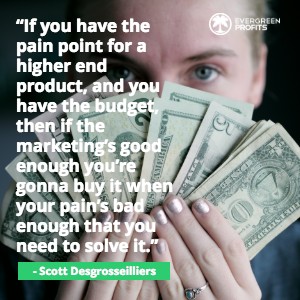
Joe: I think that just right there, like recently, at least for Matt and because I mean still to this day, we don't have a tracking totally dialed in that should change soon with Wicked Reports, but the whole thing is I think the Aha was the chill, but also how I'm just sticking within how much more money you can make with something. If you feed the algorithms, if you know your numbers more or less where they're coming from, I mean your, your business can completely change very quickly.
Matt: Yeah. Well, I mean just from, from being the number. So in our business, I'm the numbers guy. I'm also the media buyer for our business. So that's pretty much what my head is down focused on every day. I find it difficult to scale a retarget ads because you know, the retarget ads are only as good as how many people you can put in that audience. And the thing that I never really have a good idea on is what things are best driving people into that retargeting audience, right? I know my retargeting ads work once somebody is on that audience, but I don't know, you know, we've got traffic coming from SEO, we've got traffic coming from Google ads, Google display network, Twitter ads, Youtube ads, a Taboola, all this stuff. We have traffic driving in and I'm just, my mentality is just as much traffic as I can drive into getting on this retargeting pixel and then let the retargeting pixel do the work. But I have a feeling I could probably save us loads of money if I knew which of those initial cold traffic sources led to that final retarget sale. Yeah, well you can start.
Scott: If you have enough volume, you could have your retargeting audiences split up and include the, the UTM source equals to Beulah for example. And find out if Taboola traffic is shitty or ends up being good. And then do the same for even if you just did a source. So if you had your six different sources, you could find out. And then also possibly exclude your email list from those and then separately retarget your email list on its own to see if it's really just your juicy email list or your podcast listeners. You've got to segment them all out, which takes the lead, you know, if you're doing all that, you have to know what, how to do that. We do in wicked reports we have, you know, are they on my email list but they haven't poked at demo and then okay, have they booked it, dealt with that, my thought. And then that's a different sequence, you know, this is different retargeting campaign. Cue them up between email, facebook and ad words. So I'll be the same type of message for the week.
Matt: So does Wicked Reports actually help you find the audiences for Facebook too then?
Scott: We don't yet. We might get into it because I have to create a way. I realize man says that that's not very hard to do from the API perspective. I was kicking it around. I haven't decided yet. Not yet though
Matt: If I can influence you. Maybe just using Wicked without having to create, let's say, you know, seven or eight different audiences based on the original cold traffic source, I could use wicked and wicked would, would help me flesh out that data without needing to create all those different ad campaigns. Right. Are those ad sets?
Scott: Yeah, I mean a lot. I mean a lot of things I see too when I audit accounts and I had this problem in our own account recently slept by. I was going to cold traffic and they don't exclude their email list is a huge problem because then it's not really cold so it makes sure you have to think, oh hey, it's going to work. So sometimes they to see those campaigns, they work for like three, three days. Okay. Then they go to hell. Well that's because. Oh yeah, some people on your email that's maybe clicked on it and then now it's just a pure cold and going nowhere.
Matt: Yeah, there's so much. Here's a question. I actually don't know if there's a good answer to this because it's probably different for all the different businesses, but is there, has there been a sort of traffic source that has presented itself through all the data that's being collected? Has there been a traffic source that's been surprising to most people that use wicked?
Scott: Well, I'd never heard before his help articles. I couldn't believe he put you to tracks his health article, help articles, which was awesome. And also he's like, they were one of his top source if people are clicking around on his help or as like resources prime thing. So they put a lot of effort into those I guess, and that showed hey, keep doing or do it in double down on it. The surprise for me is always nail still those really well. Even though everyone just rips it. I we're supposed to do bots. I mean I'm an early adopter. I think bots are cool, but now still works was the biggest surprise more than anything. I mean, but also the other thing is that everything's relative to your business. So you gotta kind of get to get stats and try it out, you know, you see some guru or guru or whatever the hell I'm talking about.
Scott: You say, oh, Scott said this must be gospel. No, it's just been what's worked on the people I've seen. There's always going to be your unique moment in time with your audience that based on the way you're doing your message, that's why you got to track your own stuff because it's going to be slightly better or worse. It's not like, you know, like the machine by digital marketer went down on that email sequence, send it out. It worked with from varying degrees depending on all sorts of factors. It wasn't an automatic. We ended for everyone. It depended on who used it, how they applied it. So that's why you gotta get your own, your own stats to decide whether it's working for them.
Matt: Now, another question I wanted to ask quickly as well is I want to touch on your onboarding sequence in your business. I know you've got a pretty interesting way of onboarding people. That's that's different than you typically see and you kind of already hinted at it earlier where you give somebody 100 bucks just for taking that step one. Can you kinda walk us through that a little bit and, and, and, and what people could expect if they're gonna grab Wicked
Scott: Sure. We overhauled it.
Joe: Sure
Wicked Reports Onboarding Process
Scott: Churn went down 400 percent. So we're, we knew what worked and what it was is we were psychotically obsessively, somewhat annoying if you didn't do a retail. And the reason why is, you know, I mean we're not cheap and easy to use the data to make a decision or else why are you paying them? Right? So we first said, okay, we need them. And you see we saw online, you know, I read a lot of, I was reading a fair amount about that topic because it was our on boarding. I didn't love it. And they all said you need that Aha moment. And I was like, well that doesn't happen with wicked reports the first day, unless you're active campaign or Mailchimp, we can provide historical email revenue for every email you've ever sent. So that's pretty awesome. You can say, hey, I sent an email six months ago. I think it was good, but I'll tell you after like a day. So that's awesome.
Matt: One of those two systems, that MailChimp's functionality coming out in about a week
Scott: ActiveCampaign's already there.
Joe: By the time this goes live, that should be out, then it will be.
Scott: And so what I was like, okay, we need a delayed gratification because you got to go. We have some predictive behavior stuff we can do in your orders. Things that are cool, but it's not enough to make you stay. We need to know that you're gonna make a decision. So that's how we came about with $100 to make it submitted decision in 14 days. But then there were key steps that you had to do and how it used to be was you loved and you signed up. You watched the super long video and then you had to go do it all and that was like, they're not our customer support. People have to get on like two, three calls with people to make sure they even tracked anything just because they're busy, you know, and you buy it and then you're busy and I don't want to watch this video to just log in and see like no data and you'd get all irritated with wicked.
Scott: That's how it was for like two years because we're busy doing stuff and we just, you know, people were kept buying and staying on, you know, or like big waves like yapping us up. So we figured we're all set. I was like, you know what, we're not doing the best support here. So now the having people pick a focus and pick a strategy upfront, just then the car now. So I have all these checklists built for the customer success team of how to answer the different things. So then when they're talking to someone or when or what the content we give them up front is based on what's their most important reason they bought. And what are they doing in their marketing? So if you said, I'm doing adwords retargeting, well am I going to help you? We're going to have you make a decision on your average retargeting and make sure that's tracked.
Scott: Make sure you understand what you're looking at there. Because once you get one thing in wicked, you kind of get all of them. But two, you get one thing, you don't get any of it. So we had that 14 day we had the countdown timer. When you log in, how long you have left to get your hundred bucks because we need, we almost need to run basically a deadline funnel and our customers to take an action because we know if they don't take an action they're going to be like, oh screw it. Sure. So we just kind of embraced the reality and you know, it's made a big difference. And then we, you can unlock. You get a one on one call with someone. We put it in the middle of the checklist. I think it's like a 12 step thing. One of them's like, join our user group.
Scott: One is install a chrome extension because we show the data inside of facebook. If you're clicked on a campaign, we look and say what campaign it is and what date range and we show the Roi report inside of facebook. It slides out and the panel, it's pretty cool. Well we want to make sure you know something like, Oh wow, that's cool. Oh yeah. Like, sure. We had it for three months on Ollie. Pilsen. He sounds like a bunch of wicked accounts. He didn't know. So I was like, Shit. I was like we're just going to have people do it and have to check it off to get to their money, like two seconds, but just so making sure you don't want to assume anything. And so that made a huge difference. But also if people aren't doing it then when we have auto emails going out, hey you haven't authorized like your crm because if they don't authorize and pulling the data were dead. Thing is reliable, verifiable data. Well if we don't have your revenue data flow then we can help you with anything. So we have that right.
Joe: I love the onboarding and that's in, I liked that we're bringing it up here because, I mean, I would say it's a good 95 percent of tools that people invest in, especially if they are really committed to growing their business with that tool and not just fly by night, you know, I'm going to try this thing. I canceled it in a couple of months. It's like, no, if you're actually going, going deep on this thing, you want to know and be guided by experts to actually do it right from the day one. And I think it's just a lot of people just kind of lose interest after, you know, a week dicking around with the tool and you're like, oh, this looks like a really cool dashboard. It's like, no, we're not a dashboard, a dashboard. I know. And that's, I could see people just seeing like, oh, cool stats, like no attribution.
Scott: Yes. More I realized that it's more of a framework to approach your marketing than it is a dashboard tool. So we never slept weird dashboards at the same time. We struggled initially with marketing to figure out what should we call ourselves without the 25 words and we're still refining that data-driven because where we're headed, I like that as the platform part of it too close.
Matt: I love that. I love that. Well cool. I mean we could probably talk about the tracking and all that stuff for hours on end and I would totally nerd out about it. Joe would fall asleep, but I would totally nerd out about it. I liked the after all the nerd stuff and looking at what the results are and what to do. But I do want to be respectful of your time. And, we have a couple wrap up questions that we ask all of our guests. One of them is about books. Do you have any books that you tend to, you know, come back to once a year or you find yourself recommending a lot? It could be about the topic we talked about today are just completely different. Just we're always looking for ideas for new books
Scott: Well two spiritual books I like are the course in miracles and the surrender experiment totally potentially just changed the way you view life. So I would be remiss not to recommend those. Businesswise. You know, rocket fuel really helped. That's a good one. Rocket Fuel really helped the e myth. I've read that one probably five times and one, you may not have heard a lot of crap. Let me go it because this guy by Robert Fritz, oh, the path of least resistance and there's a book in life about that. And then the path of least resistance for managers and his idea, which is genius, is that reason why people, you know, start to move forward either in life or into your business, starts to move forward. And that goes back oscillates back and forth is because you have a don't. You don't have to set up a structure or a goal framework that's going to work.
Scott: I don't think I did justice to that meeting. Well. So a company will say, oh we've got to invest more in R&D, and then they'll invest more in R&D, and they'll start to cook up some new products, but then they'll be like, oh crap, I'm now where we need to make the number this quarter we got caught r and d and then they have no more new products or sales says we need more leads, you get a ton of more leads. And I'm like, hold up. They make a bunch of sales and onboarding. It's like holy crap, we can't support all these customers slowdown in the market. And so that happens a lot. And so when his premise is you've got to have one overall goal and then sub goals that have to support the overall goal.
Scott: Yeah, you guys have the flow chart, you've got a nest your goals. So they can't conflict with the higher goals. It's like if I say, oh we want to wake up reports is going to be $10 million company, okay, well that means 4,000 customers. So then if we're going to have 40,000 customers, we have a tech architecture that supports to get accustomed to success, get, have an onboarding, all of those other teams have to consider that goal in their goals. Otherwise they, they, you know, they might do a bunch of decisions that don't support it, then we're going to have to scrap. And so it really helped me think and it paniced some of the team, what the goal is that we add. So it's like, well, okay, now you know, we gotta to like scaling that made us, you know, build, build things differently.
Joe: It's essentially like what you do at wicked is like, you know, you have defined the goal and then you kind of track the path but know what's involved there. And this is just, you know, in the bigger picture as a company or a life, like you said, that's cool. I like that a lot. Strategy and tactics combined. So I'm wrapping it up. Where can people go find you? And definitely check out wicked.
Scott: Well, I'm on, I'm on your podcast. We got wickedreports.com/hustle.
Joe: Right on. Cool man. Yeah, that's a, that's going to give you. I think that page's got some good information. I know you guys have some help there too, to answer questions and get people kind of interested in seeing if they are qualified. Ready to take the leap with you.
Matt: Yeah, and I mean we're about to be customers were pretty much sold on it because I've pretty much aired my frustrations with tracking on this episode and it sounds like we need Wicked, so for sure. Awesome. Well thank you man.
Scott: Thank you.







